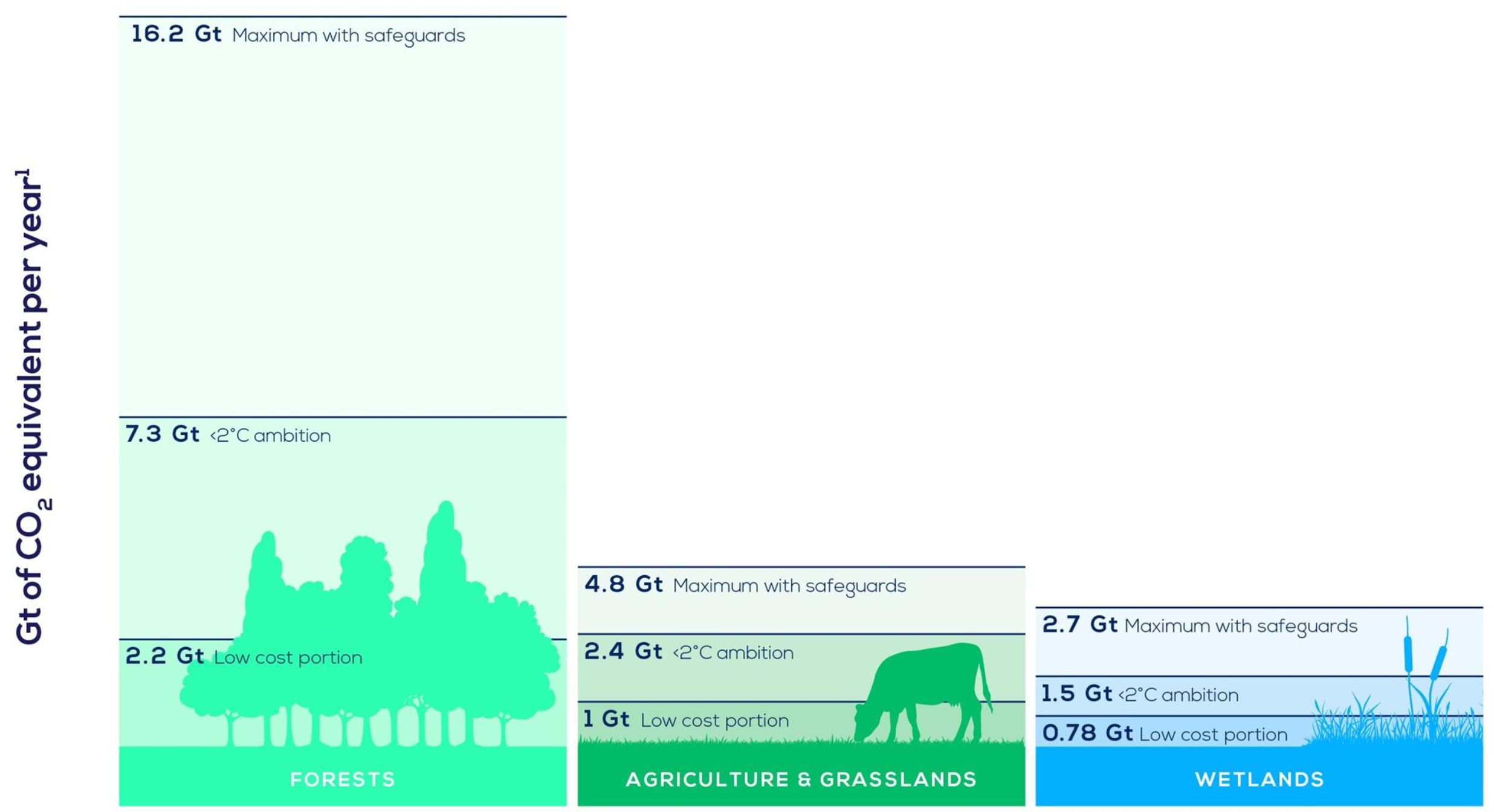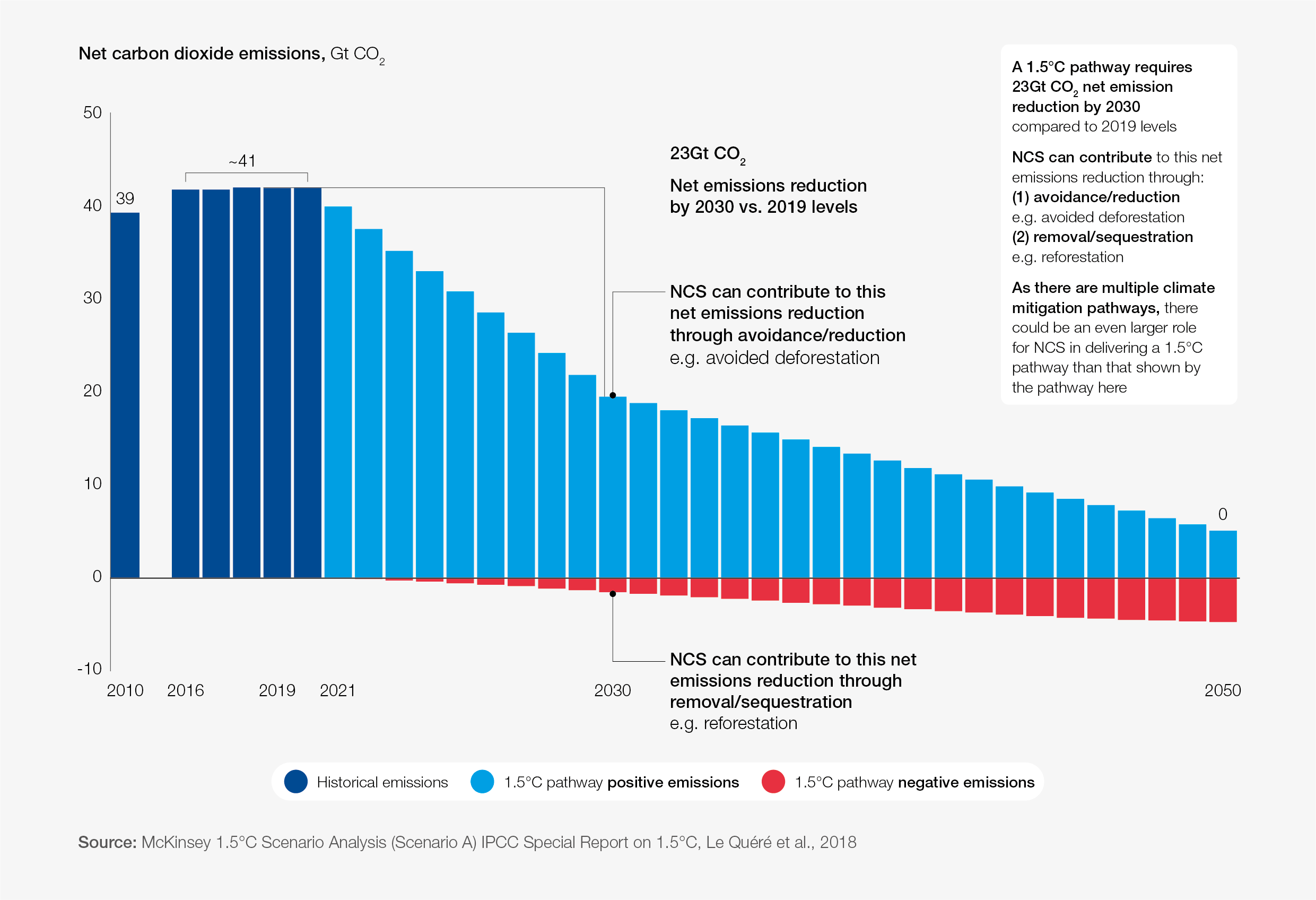How working with nature can help us tackle climate change

We must rebuild nature in order to tackle climate change. Image: UNSPLASH/Vitor Monthay

Get involved with our crowdsourced digital platform to deliver impact at scale
Stay up to date:
Climate Indicators
- The loss of nature is a key driver of climate change.
- Natural climate solutions (NCS) increase carbon storage and/or avoid greenhouse gas emissions.
- They are a crucial opportunity for companies to address climate change, in addition to helping nature recovery.
- Giulia Carbone asks how we can increase the number of NCS, and why their role in addressing the global climate, nature and inequality crises is so critical.
We face unprecedented, intertwined crises: the destruction of nature, accelerating climate change and growing inequality. Nature loss is a key driver of climate change, with the loss of forests and coastal ecosystems worldwide contributing 4.8 and 1 billion tonnes of CO2 per year respectively, and food systems producing over 30% of global annual GHG emissions.
Natural climate solutions (NCS) provide an opportunity for companies to address climate change while also contributing to nature recovery and advancing the Sustainable Development Goals. By investing in high-quality NCS carbon credits―as a top up, but never instead of decarbonization in line with a 1.5°C future―businesses can demonstrate leadership in tackling the interconnected climate and nature crises, while also delivering a more equitable future for many.
NCS are “conservation, restoration and improved land management actions that increase carbon storage and/or avoid greenhouse gas emissions”. They play an important role in reducing emissions, for example, by lowering rates of deforestation and loss of other natural habitats, and removing carbon, such as through forest restoration activities. NCS provide other valuable benefits that address societal challenges, such as conserving biodiversity, restoring degraded lands and soils, and supporting sustainable livelihoods in rural landscapes.
NCS can provide up to one-third of the climate mitigation required to meet the Paris Agreement goals. Despite this potential, the 2021 UNEP State of Finance for Nature report indicated that funding for NCS needs to triple by 2030 and increase fourfold by 2050, reiterating the urgency to develop mechanisms by which the private sector can channel finance toward NCS.
Supported by campaigns such as Race to Zero, led by the High-Level Climate Champions for Climate Action, and with greater clarity on what corporate net zero looks like with the recent launch of the SBTi’s Net Zero Standard, companies are starting to take the necessary action required. Leading companies are decarbonizing in line with what science requires for a 1.5°C world; for organizations with a footprint in the land sector, this can include investing in NCS within their value chains.
Importantly, the companies with the highest ambition to accelerate climate recovery are also compensating for their residual emissions with NCS carbon credits. In this way, companies can demonstrate they are committed to the decarbonization required by a 1.5°C course, but are also going above and beyond this while supporting the diverse range of positive impacts on nature, climate and communities required to solve the challenges of today.
As this high-ambition practice grows, voluntary carbon markets are likely to expand rapidly, enabled by initiatives such as the Taskforce on Scaling Voluntary Carbon Markets and others. It is critical that companies and other stakeholders work together now and ensure that scale is achieved with companies aiming for the highest quality and integrity standards from day one. This is the only way to ensure that these flows of finance genuinely lead to climate impact as well as positive outcomes for nature and people.
The NCS Alliance―a multistakeholder coalition including companies, NGOs, standards bodies, and project developers―is working on this exact challenge. In July 2021, the NCSA published Natural Climate Solutions for Corporates, a guidance document that set out quality and integrity guardrails specific to NCS, for both producers of NCS credits and purchasers. For companies retiring credits, this guidance reinforces the need for decarbonization following the greenhouse gas mitigation hierarchy, and at levels consistent with Paris, in addition to the purchasing of NCS credits. For producers, this covers the safeguards that should be in place when investing in and developing NCS projects and programs to secure robust carbon accounting and the maximum possible sustainable benefits to climate, nature and people.
With guardrails in place, the NCS Alliance is moving to generating a corporate demand signal for high-quality NCS credits through the Natural Climate Solutions Investment Accelerator. The accelerator aims to increase private sector investment into nature to an aggregated 1 gigatonne of CO2e emissions reductions and removals from NCS per year by 2025. On Nature Day at COP26 on November 6, the NCS Alliance supported by Bank of America, Bayer, Boston Consulting Group, McKinsey & Company, and Unilever invited companies to join the accelerator and help us work collaboratively to meet this ambitious yet crucial target
In demonstrating clear private sector demand for high-quality credits, the NCS Investment Accelerator will address three key challenges in this space: the lack of a demand signal, low recognition for participating companies and fragmentation of private sector investment campaigns and initiatives.
Through the accelerator, companies commit collectively to the ambitious target, which will send a strong demand signal to policy makers, suppliers and carbon exchange bodies with the aim to “unlock the supply pipelines needed to meet global net-zero announcements and build confidence with policymakers as they roll out new compliance and jurisdictional schemes.”
By striving for high quality supply (credits) and demand (their usage) the accelerator is building the platform to position participating businesses as ‘NCS Champions’ and sustainability leaders, while also inspiring other businesses to invest in high quality NCS. Showcasing best practice on how to invest in NCS with integrity and the companies who are doing so, the accelerator will build trust in the system now before markets expand.
What is the World Economic Forum doing on natural climate solutions?
The accelerator will also serve as an “umbrella” campaign to support other aligned initiatives such as the LEAF Coalition, 1t.org, business coalitions such as the Business Alliance to Scale Climate Solutions (BASCS), and is supported by the We Mean Business Coalition. In this way, the accelerator will act as a “one-stop shop” for business to collate their NCS commitments across the breadth of NCS activities supported, providing a platform for the private sector as well as all other stakeholders in the NCS space to take action together.
Tackling the climate, nature and inequality crises together demands that we look to NCS to unlock natural ecosystems’ abilities to address these interconnected crises. Scaling up NCS is a crucial step if we are to address these challenges, reach net zero and facilitate the transition to a future where we live well, within planetary boundaries. The NCS Investment Accelerator can be a valuable linchpin on this mission and we invite all eligible companies to join the campaign.
Don't miss any update on this topic
Create a free account and access your personalized content collection with our latest publications and analyses.
License and Republishing
World Economic Forum articles may be republished in accordance with the Creative Commons Attribution-NonCommercial-NoDerivatives 4.0 International Public License, and in accordance with our Terms of Use.
The views expressed in this article are those of the author alone and not the World Economic Forum.
Related topics:
The Agenda Weekly
A weekly update of the most important issues driving the global agenda
You can unsubscribe at any time using the link in our emails. For more details, review our privacy policy.
More on Climate ActionSee all
Kate Whiting
April 26, 2024
Santiago Gowland
April 24, 2024
Amanda Young and Ginelle Greene-Dewasmes
April 23, 2024
Andrea Willige
April 23, 2024
Agustin Rosello, Anali Bustos, Fernando Morales de Rueda, Jennifer Hong and Paula Sarigumba
April 23, 2024
Carlos Correa
April 22, 2024









